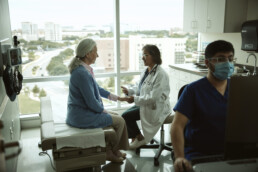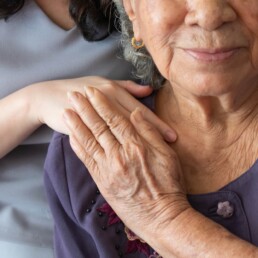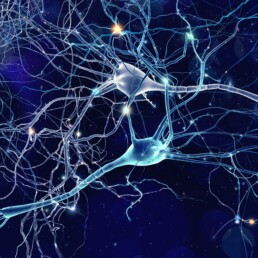Aging Studies
To bring about healthy aging — an era of life that we will all want to experience, the UT Health San Antonio team has a wide array of initiatives and centers committed to researching Alzheimer’s and other neurodegenerative diseases.

How we are advancing aging studies





Aging Statistics
Face the Facts
The number of senior citizens is expected to almost double and will represent more than 20 percent of the U.S. population by the year 2050.
With more than 390,000 Texans age 65 or older living with Alzheimer’s or other dementias, these numbers are expected to increase nearly 30% by 2025.
13 South Texas counties are listed among the top 25 in the U.S. with the highest prevalence of Alzheimer’s disease.
Alzheimer’s and Neurodegenerative Diseases
According to the World Health Organization, the number of people with Alzheimer’s disease and other forms of dementia will more than triple, reaching 152 million over the next 20 years. The present and future states of brain health of Texans and others around the globe is what drives our work, with the goal of addressing the urgency of this growing issue through education, research and patient care, as well as more support for patients, their families and caregivers.

Glenn Biggs Institute for Alzheimer’s and Neurodegenerative Diseases
A national center of excellence for Alzheimer’s disease, other neurodegenerative diseases, dementia care and research, the Biggs Institute puts discoveries into practice with its researchers working to understand the risks, predictors, prevention and possible treatments for Alzheimer’s disease, mild cognitive impairment and related conditions.
Collaborating with the Biggs Institute is the School of Nursing’s Caring for the Caregiver program, which offers education through classes and workshops for family caregivers, opportunities for socialization and clinical care to support families living with dementia.
National Institute on Aging-Designated Alzheimer’s Disease Research Center (ADRC)
The Biggs Institute at The University of Texas Health Science Center San Antonio is one of 33 centers in the nation and the only one in Texas recognized as a National Institute on Aging (NIA)- designated Alzheimer’s Disease Research Center. The Biggs Institute is led by Sudha Seshadri, MD, who was recruited from Boston University to found our center.
The Biggs Institute and the Texas Statewide Brain Bank
UT Health San Antonio, through its Glenn Biggs Institute for Alzheimer’s and Neurodegenerative Diseases, has partnered to establish and house the Texas Statewide Brain Bank, supported by a collaborative research grant from the Texas Alzheimer’s Research and Care Consortium (TARCC). The Texas Statewide Brain Bank Initiative will help facilitate brain donation and TARCC member institutions, which include UT Health San Antonio, Baylor, the University of North Texas, Texas A&M, Texas Tech, UT Austin, UT Medical Branch at Galveston, UTHealth Houston, UT Rio Grande Valley and UT Southwestern Medical Center.
Related Articles
Caring for the Caregiver
The Caring for the Caregiver program in the UT Health San Antonio School of Nursing supports family caregivers through education, research and practice. The program provides education through classes and workshops for family caregivers, opportunities for socialization and clinical care to support families living with dementia.
Related Articles
Longevity and Aging Studies
The Barshop Institute at UT Health San Antonio is designed to understand the basic biology of aging, discover therapies that will treat and cure the diseases of aging by fostering dynamic, collaborative research, education and training of future scientists and clinicians, as well as promote public awareness of age-related issues.

Sam and Ann Barshop Institute for Longevity and Aging Studies
The Barshop Institute is the only aging-intensive research institute in the country to have four peer-reviewed designations: two National Institute on Aging (NIA)-funded centers (Nathan Shock and Claude D. Pepper centers), a testing site of the NIA-sponsored Interventions Testing Program and a U.S. Department of Veterans Affairs Geriatric Research, Education and Clinical Center.
The Barshop Institute’s areas of research include:
Neurology, Neurophysiology and Neuromuscular Disorders
With research programs and clinics recognized as national centers of excellence in neuromuscular treatment including amyotrophic lateral sclerosis (ALS also known as Lou Gehrig’s disease), multiple sclerosis (MS) and Parkinson’s disease, faculty members at UT Health Science Center San Antonio bring together deep expertise in brain health and its effect on the nervous system, spinal cord, peripheral nerves and muscles.

South Texas ALS Association Center of Excellence
Leading a significant amount of this work is Carlayne Jackson, MD, FAAN, who serves as chair of the Department of Neurology in the Joe R. and Teresa Lozano Long School of Medicine. She has led research programs and developed clinics recognized as national centers of excellence in neuromuscular treatment.
Jackson is medical director for the South Texas ALS Association Center of Excellence and the MDA-ALS Research Center. She has participated in more than 60 multicenter clinical trials has contributed to more than 240 publications.
Vice President for Research
Professor of Psychiatry and Behavioral Sciences
UT Health Physicians Movement Disorders Program
UT Health San Antonio is the only academic movement disorders center in the area. The center’s fellowship-trained specialists treat Parkinson’s disease, essential tremor, dystonias, Huntington’s disease and other disorders. Therapies include botulinum toxin (Botox) injections, medications and deep brain simulation, which is surgical therapy for Parkinson’s, dystonias and essential tremor. The Movement Disorders Program is soon to launch human clinical research studies of:
- Medications to control tremor.
- Medications to delay disease progression.
- Medications to prevent bone fractures from falls.
- Medications used in hallucinations and Parkinson’s dementia.
To see a physician of the center or inquire about clinical trials, call 210-450-9700.
Related Articles
The University of Texas Health Science Center at San Antonio (UT Health San Antonio), a primary driver for San Antonio's $44.1 billion health care and biosciences sector, is the largest academic research instituion in South Texas with an annual research portfolio of more than $360 million. Driving substantial economic impact with its six professional schools, a diverse workforce of 7,900, an annual operating budget of $1.08 billion and clinical practices that provide 2.6 million patient visits each year, UT Health San Antonio plans to add more than 1,500 higher-wage jobs over the next five years to serve San Antonio, Bexar County and South Texas.